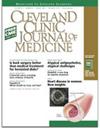非消化内科医生的胃痉挛。
IF 3.4
4区 医学
Q1 MEDICINE, GENERAL & INTERNAL
引用次数: 0
摘要
胃瘫是一种以恶心、呕吐和餐后饱胀为特征的异质性运动障碍。其诊断需要有固体食物胃排空延迟的客观记录,并排除机械性梗阻。其流行病学尚不清楚,主要病因是糖尿病和特发性疾病。主要症状经常同时出现。治疗包括营养评估、饮食改变、药物评估、血糖控制(针对糖尿病患者)和症状缓解。在这篇综述中,我们将探讨非肠胃病学家可能遇到的挑战,以及他们如何利用当前的建议来管理胃瘫患者。本文章由计算机程序翻译,如有差异,请以英文原文为准。
Gastroparesis for the nongastroenterologist.
Gastroparesis is a heterogeneous motility disorder characterized by nausea, vomiting, and postprandial fullness. Its diagnosis requires objective documentation of delayed gastric emptying of solid food and exclusion of mechanical obstruction. Its epidemiology is unclear, and the main causes are diabetes mellitus and idiopathic disease. Cardinal symptoms often co-occur. Management involves nutritional assessment, dietary changes, drug evaluation, glycemic control (for patients with diabetes mellitus), and symptom relief. In this review, we explore challenges nongastroenterologists may encounter and how they can use current recommendations to manage patients with gastroparesis.
求助全文
通过发布文献求助,成功后即可免费获取论文全文。
去求助
来源期刊

Cleveland Clinic Journal of Medicine
医学-医学:内科
CiteScore
3.80
自引率
0.00%
发文量
109
审稿时长
6-12 weeks
期刊介绍:
The mission of Cleveland Clinic Journal of Medicine (CCJM) is to provide its readers with up-to-date, practical, clinical information relevant to internal medicine, cardiology, and related fields. Consistent with this mission, CCJM focuses on timely review articles and other content that has a continuing-education orientation rather than on original research or case reports. CCJM authors, drawn from Cleveland Clinic and other top medical institutions throughout the world, are asked to identify new findings that are changing the practice of medicine and to advise readers how to apply them in daily patient care. Authors are chosen for their experience, acquired through caring for patients, teaching other physicians, and researching clinical questions.
 求助内容:
求助内容: 应助结果提醒方式:
应助结果提醒方式:


